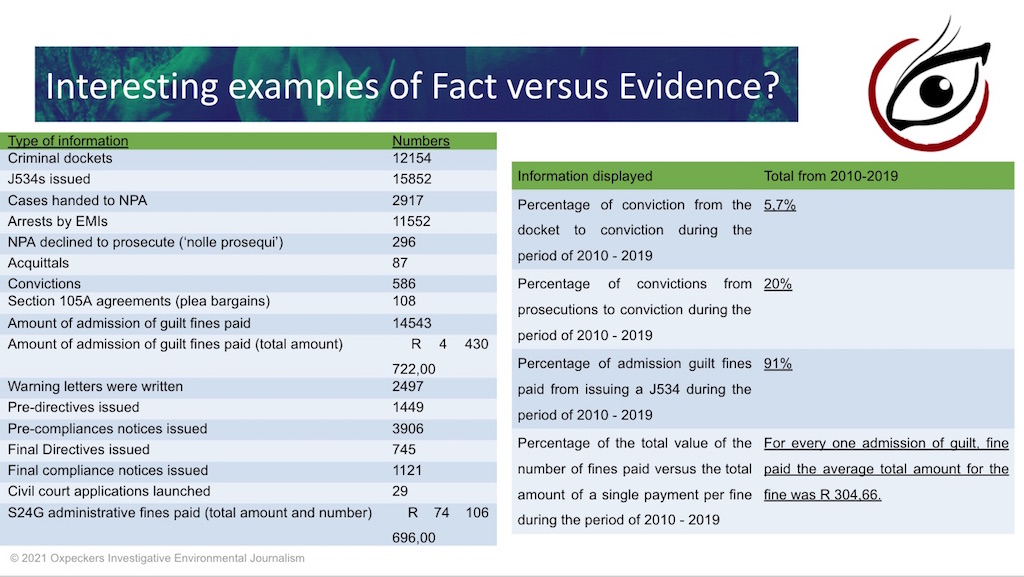
25 Aug Using the law to access wildlife crime data
Attorneys from the Legal Resources Centre train journalists on legal frameworks and access to information in Southern African countries. Dianne Tipping-Woods reports

In the spotlight: Information on busts and seizures is often splashed in the media, but data about what happens afterwards is not easy to come by. Photo © Dianne Tipping-Woods
Data on wildlife crime in Southern Africa isn’t easy to obtain, despite legislation in several countries guaranteeing access to information that is in the public interest.
A recent training event on using the law to access wildlife crime data helped African journalists understand their rights, and provided practical tips on how to navigate the legislative environments in various countries in support of better reporting.
The event on August 18 2021 was hosted virtually by Oxpeckers Investigative Environmental Journalism, with the support of USAID’s VukaNow Activity. It was the second training event of the #WildEye: A Wildlife Crime Tracking Tool and Training for Investigative Journalism in Southern Africa programme, which is building unique data sets, a digital tracking platform and journalism capacity to report on illegal trade in wildlife.
“One of the biggest challenges for journalists working on wildlife crime is getting access to reliable, official data. Their efforts are often hindered by issues of bureaucracy, red tape, resistance, intimidation, and currently, Covid-related restrictions,” noted Oxpeckers editor Fiona Macleod.
“In my experience, most official channels for accessing information – outside of South Africa – don’t do what they are supposed to do. They actually hinder access to information,” said investigative reporter Oscar Nkala, who has been reporting on wildlife crime in Southern Africa for many years.

Dismal picture: Research on the outcomes of environmental crimes presented by lawyers from the Legal Resources Centre
Environmental law
Lucien Limarcher, an attorney at the South African Legal Resources Centre and a member of both the IUCN’s World Commission on Environmental Law and the Environmental Law Association of South Africa, helped facilitate the training event.
Limacher said a number of countries in the region have enabling legislation around accessing information. However, this right is often not actionable or enforceable, “and sometimes no information is available”, he noted.
Knowing the laws around data access and privacy, and what you can and cannot access legally, is a critical step in improving access to information for journalists reporting on wildlife crime. This was the focus of Limacher’s presentation with his legal colleagues, Lauren Nel and Zaahid Laher.
They introduced the various legal frameworks in Southern African countries, gave an overview of court data that’s on the public record, looked at what constitutes evidence when it comes to collecting data, and shared information on privacy and data collection. They concluded the training with tips to assist journalists to take a multi-pronged approach to data gathering.
Ten key take-aways from the day were:
Be persistent with officials
Include as many relevant officials as possible in requests for data
Make it easy for them to give you information by being specific in your requests
Keep records of all communications with them
Go higher up than the appointed information officer, if necessary
Consult a lawyer if you get stuck
Know court and legal procedures
Research data privacy, in order to know what you can and cannot access legally
Work with civil society organisations
Network widely as information can come from many sources
The event was part of the #WildEye professional support programme, which is training data journalists based in Zimbabwe, South Africa, Malawi, Botswana and Mozambique. They are in the process of sourcing data sets of seizures, arrests, court cases and convictions related to wildlife trafficking.
Training events over the next four months will further enhance the capacity of the team to collate and analyse the data sets. These will be hosted and shared on the digital #WildEye Southern Africa tracking tool, due to be launched in November 2021, thanks to support from USAID.
Find the presentation by the Legal Resources Centre about accessing information on wildlife crime here.
For more details on the programme, see Enhancing wildlife crime journalism with data
